12 july 2019
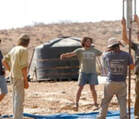
Several illegal Israeli colonialist settlers invaded, Friday, Khirbat Samra Palestinian village, in the West Bank’s Northern Plains, and occupied irrigation wells.
Palestinian human rights activist, Aref Daraghma, said the colonists, occupied all the Palestinian wells, and prevented the farmers from using them, before using the water for their cows.
Daraghma added that the colonists prevented the Palestinians from using the well to feed their sheep, and planted trees in Khallet Hamad area, near the tents of local shepherds, in preparation to occupy the lands.
The Palestinians in the Northern Plains of the West Bank are subject to ongoing violations by the illegal Israeli colonialist settlers, and face frequent assaults and displacement by the Israeli soldiers.
Palestinian human rights activist, Aref Daraghma, said the colonists, occupied all the Palestinian wells, and prevented the farmers from using them, before using the water for their cows.
Daraghma added that the colonists prevented the Palestinians from using the well to feed their sheep, and planted trees in Khallet Hamad area, near the tents of local shepherds, in preparation to occupy the lands.
The Palestinians in the Northern Plains of the West Bank are subject to ongoing violations by the illegal Israeli colonialist settlers, and face frequent assaults and displacement by the Israeli soldiers.
4 july 2019
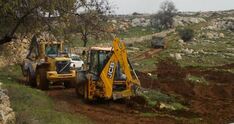
The Israeli occupation forces (IOF) on Thursday demolished a nature reserve in the east of Yatta, south of al-Khalil in the West Bank.
Chief of Kaabneh and Daqiqa villages Udeh an-Najadah said Israeli bulldozers escorted by troops embarked on removing the fence of the Daqiqa nature reserve, which was established on about 150 dunums of land near the separation wall.
Najadah added that the bulldozers also razed trees and wells in the nature reserve as part of Israeli efforts to evict the local residents from the eastern areas of Yatta.
The Daqiqa nature reserve was established about 10 years ago with the assistance of foreign institutions in order to protect the land from Israel’s settlement activity. It contained over 5,000 trees and four wells for the collection of rainwater and was fenced with barbed wire.
There are about 250 Palestinian citizens living in Daqiqa village and they work in agriculture and animal husbandry.
The Israeli occupation authority seeks to evict the local residents from their area at the pretext they live in a military training region.
In a similar incident, the IOF demolished on Wednesday morning a park, water wells and a nature reserve in the villages of Khashm al-Daraj and Umm al-Khair in the east of Yatta.
Chief of Kaabneh and Daqiqa villages Udeh an-Najadah said Israeli bulldozers escorted by troops embarked on removing the fence of the Daqiqa nature reserve, which was established on about 150 dunums of land near the separation wall.
Najadah added that the bulldozers also razed trees and wells in the nature reserve as part of Israeli efforts to evict the local residents from the eastern areas of Yatta.
The Daqiqa nature reserve was established about 10 years ago with the assistance of foreign institutions in order to protect the land from Israel’s settlement activity. It contained over 5,000 trees and four wells for the collection of rainwater and was fenced with barbed wire.
There are about 250 Palestinian citizens living in Daqiqa village and they work in agriculture and animal husbandry.
The Israeli occupation authority seeks to evict the local residents from their area at the pretext they live in a military training region.
In a similar incident, the IOF demolished on Wednesday morning a park, water wells and a nature reserve in the villages of Khashm al-Daraj and Umm al-Khair in the east of Yatta.
3 july 2019
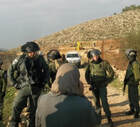
Israeli soldiers invaded, Wednesday, the al-Jiftlik village, in the West Bank’s Central Plains, and confiscated an irrigation network from lands owned by a Palestinian from the village.
Media sources said the soldiers invaded the lands, owned by a local farmer, identified as Na’el Bani Odah, and confiscated the irrigation network providing his farmlands with the needed water.
They added that the confiscated network and pipes were used to provide water for nearly 30 dunams, which for the past eight seasons have been planted with grapevines.
The incident is part of repeated violations carried out by the army, and in many cases by illegal colonialist settlers, in several parts of the occupied West Bank.
Media sources said the soldiers invaded the lands, owned by a local farmer, identified as Na’el Bani Odah, and confiscated the irrigation network providing his farmlands with the needed water.
They added that the confiscated network and pipes were used to provide water for nearly 30 dunams, which for the past eight seasons have been planted with grapevines.
The incident is part of repeated violations carried out by the army, and in many cases by illegal colonialist settlers, in several parts of the occupied West Bank.
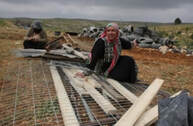
Israeli soldiers invaded, Wednesday, a natural reserve area in the villages of Khashm ad-Daraj and Um el-Kheir, east of Yatta town, south of the southern West Bank city of Hebron, and demolished a children’s park, in addition to uprooting trees and demolishing water wells.
Ibrahim Eid al-Hathalin, the head of Khashm ad-Daraj village council, said dozens of soldiers invaded the area, before demolishing a children’s park, used by dozens of families.
He added that the soldiers also demolished several water wells, in addition to uprooting evergreens and other trees in the natural reserve.
The Israeli army claimed that the invaded lands, and the uprooted trees, are in an area “designated for military training.”
It is worth mentioning that the areas east of Yatta and its surrounding communities are subject to constant Israeli invasions and violations, including the demolition of homes and residential structures, in addition to shed and barns, as Israel is trying to illegally annex the lands and use them for its army and for the construction and expansion of Israel’s colonies.
In addition, the soldiers invaded Yatta town, especially downtown areas, before storming and ransacking many homes and shops, and confiscated surveillance equipment.
The soldiers also installed a military roadblock at the entrance of the ath-Thaheriyya town, south of Hebron, before stopping and searching dozens of cars, and interrogated many Palestinians while inspecting their ID cards.
Ibrahim Eid al-Hathalin, the head of Khashm ad-Daraj village council, said dozens of soldiers invaded the area, before demolishing a children’s park, used by dozens of families.
He added that the soldiers also demolished several water wells, in addition to uprooting evergreens and other trees in the natural reserve.
The Israeli army claimed that the invaded lands, and the uprooted trees, are in an area “designated for military training.”
It is worth mentioning that the areas east of Yatta and its surrounding communities are subject to constant Israeli invasions and violations, including the demolition of homes and residential structures, in addition to shed and barns, as Israel is trying to illegally annex the lands and use them for its army and for the construction and expansion of Israel’s colonies.
In addition, the soldiers invaded Yatta town, especially downtown areas, before storming and ransacking many homes and shops, and confiscated surveillance equipment.
The soldiers also installed a military roadblock at the entrance of the ath-Thaheriyya town, south of Hebron, before stopping and searching dozens of cars, and interrogated many Palestinians while inspecting their ID cards.
28 june 2019
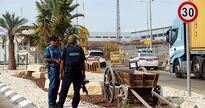
Around one thousand Palestinians were infected by polluted water and were treated in Marda village clinic while others were transferred to Salfit hospital in the northern West Bank on Thursday.
The Palestinian ministry of health said that the citizens were infected by the polluted water poured by the nearby Ariel settlement bloc into the village’s main water spring. They complained of stomach ache and nausea.
According to Palestinian officials and experts, about 60 percent of all Israeli waste is disposed of in the occupied Palestinian territories in flagrant violation of international law and environment protection laws.
The Palestinian ministry of health said that the citizens were infected by the polluted water poured by the nearby Ariel settlement bloc into the village’s main water spring. They complained of stomach ache and nausea.
According to Palestinian officials and experts, about 60 percent of all Israeli waste is disposed of in the occupied Palestinian territories in flagrant violation of international law and environment protection laws.
23 june 2019
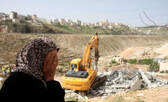
Israeli bulldozers demolished an agricultural shed and a room under construction belonging to a Palestinian resident in Qafin village, north of Tulkarem, the occupied West Bank.
Nezar Ajoli, the owner, said that a number of Israeli military jeeps, accompanied by a bulldozer, surrounded his land, located to the west of the village of Qafin, and proceeded to demolish an agricultural shed and a room under construction.
Forces further vandalized a big water tank used for agricultural purposes.
He said Israeli occupation forces informed him, last April, of their intention to demolish the room that was under construction and gave him until May 30th.
The owner added, according to WAFA, that he had prepared the necessary papers to prove his ownership of the land, however, he was surprised by the demolition which was conducted without prior notice.
Nezar Ajoli, the owner, said that a number of Israeli military jeeps, accompanied by a bulldozer, surrounded his land, located to the west of the village of Qafin, and proceeded to demolish an agricultural shed and a room under construction.
Forces further vandalized a big water tank used for agricultural purposes.
He said Israeli occupation forces informed him, last April, of their intention to demolish the room that was under construction and gave him until May 30th.
The owner added, according to WAFA, that he had prepared the necessary papers to prove his ownership of the land, however, he was surprised by the demolition which was conducted without prior notice.
19 june 2019
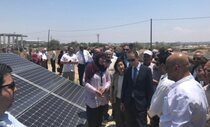
Inaugurating the Photo Voltaic Solar System for the Rafah Wastewater Treatment and Reuse Plants project. (Credit: UNDP)
The United Nations Development Programme (UNDP) and the government of Japan, in partnership with the Palestinian Ministry of Agriculture, Palestinian Energy and Natural Resources Authority (PENRA) and the Costal Municipalities Water Utility have inaugurated the Photo Voltaic Solar System, for the Rafah Wastewater Treatment and Reuse Plants project.
The project, worth $500,000, will provide more than 170,000 Palestinians, including farmers, in Gaza, with improved access to water, sanitation and hygiene services. This will be done through the provision of 200 KWp of sustainable electricity supply that will allow the Rafah Wastewater Treatment and Reuse plants to treat the wastewater for irrigation and pump the treated water into farming areas.
Takeshi Okubo, Ambassador for Palestinian Affairs and Representative of Japan to Palestine, expressed his gratitude to all partners for making the project successful including UNDP and the Palestinian counterpart.
“For the past decade, the Gaza Strip has suffered from a chronic electricity deficit as well as severe waste water problems, which undermined fragile living conditions.
Therefore, Japan provided an additional grant of $500,000 to UNDP with the aim of providing a renewable energy source as a sustainable solution to the current energy crisis which would ensure the optimal operation of the Rafah WWTP,” he said.
“Japan is committed to supporting humanitarian aspect as well as long term development plans in Gaza as a friend in need and we hope this project will alleviate the suffering of people in Gaza,” he added, according to WAFA.
According to the United Nations “Gaza in 2020: A liveable Place?” report, some 90,000 CM of raw or partially treated sewage is being discharged, daily, into the Mediterranean Sea (almost 33 MCM per year). This is causing pollution and creating public health hazards.
UNDP Head of Office in Gaza, Chitose Noguchi, said: “Energy is a critical enabler for people to live a safe, healthy and productive life. Yet, the Gaza strip has been suffering from a chronic electricity deficit since 2006.
Thanks to the Government of Japan, we have installed a renewable energy system that will improve public health and environment conditions. The 7000 CM of the treated water will be pumped to irrigate farming areas, benefiting almost 500 farmers and their families”.
The ceremony took place yesterday, at the Rafah Wastewater Treatment and Reuse Plants, and was attended by Takeshi Okubo, Chitose Noguchi, and Monther Shublaq, General Director of Coastal Municipalities Water Utility.
The United Nations Development Programme (UNDP) and the government of Japan, in partnership with the Palestinian Ministry of Agriculture, Palestinian Energy and Natural Resources Authority (PENRA) and the Costal Municipalities Water Utility have inaugurated the Photo Voltaic Solar System, for the Rafah Wastewater Treatment and Reuse Plants project.
The project, worth $500,000, will provide more than 170,000 Palestinians, including farmers, in Gaza, with improved access to water, sanitation and hygiene services. This will be done through the provision of 200 KWp of sustainable electricity supply that will allow the Rafah Wastewater Treatment and Reuse plants to treat the wastewater for irrigation and pump the treated water into farming areas.
Takeshi Okubo, Ambassador for Palestinian Affairs and Representative of Japan to Palestine, expressed his gratitude to all partners for making the project successful including UNDP and the Palestinian counterpart.
“For the past decade, the Gaza Strip has suffered from a chronic electricity deficit as well as severe waste water problems, which undermined fragile living conditions.
Therefore, Japan provided an additional grant of $500,000 to UNDP with the aim of providing a renewable energy source as a sustainable solution to the current energy crisis which would ensure the optimal operation of the Rafah WWTP,” he said.
“Japan is committed to supporting humanitarian aspect as well as long term development plans in Gaza as a friend in need and we hope this project will alleviate the suffering of people in Gaza,” he added, according to WAFA.
According to the United Nations “Gaza in 2020: A liveable Place?” report, some 90,000 CM of raw or partially treated sewage is being discharged, daily, into the Mediterranean Sea (almost 33 MCM per year). This is causing pollution and creating public health hazards.
UNDP Head of Office in Gaza, Chitose Noguchi, said: “Energy is a critical enabler for people to live a safe, healthy and productive life. Yet, the Gaza strip has been suffering from a chronic electricity deficit since 2006.
Thanks to the Government of Japan, we have installed a renewable energy system that will improve public health and environment conditions. The 7000 CM of the treated water will be pumped to irrigate farming areas, benefiting almost 500 farmers and their families”.
The ceremony took place yesterday, at the Rafah Wastewater Treatment and Reuse Plants, and was attended by Takeshi Okubo, Chitose Noguchi, and Monther Shublaq, General Director of Coastal Municipalities Water Utility.
12 june 2019
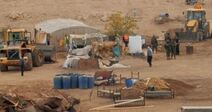
The Israeli occupation forces (IOF) on Wednesday morning destroyed dozens of agricultural structures and equipment as well as several tents and scores of water tanks in Ras al-Ahmar hamlet, east of Tubas city in the West Bank.
Local farmer Abdullah Bani Awdeh told a reporter for the Palestinian Information Center (PIC) that dozens of Israeli troops escorting military bulldozers stormed the hamlet and embarked on razing crude barns and residential tents.
Awdeh added that the soldiers also destroyed about 50 plastic water tanks.
For his part, local activist Aref Daraghmeh told the PIC that the IOF wreaked havoc on the hamlet, destroying tents, crude barns, solar energy equipment and dozens of water tanks belonging to local residents.
Local farmer Abdullah Bani Awdeh told a reporter for the Palestinian Information Center (PIC) that dozens of Israeli troops escorting military bulldozers stormed the hamlet and embarked on razing crude barns and residential tents.
Awdeh added that the soldiers also destroyed about 50 plastic water tanks.
For his part, local activist Aref Daraghmeh told the PIC that the IOF wreaked havoc on the hamlet, destroying tents, crude barns, solar energy equipment and dozens of water tanks belonging to local residents.
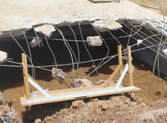
Israeli soldiers invaded, Wednesday, Aqabat Jabr village, east of Tubas in northeastern West Bank, and demolished a water well.
Resident Mohammad Yousef Dibik said the soldiers demolish his well, which contained 15 cubic meters of water, owned by Mohammad Yousef Dibik.
He told the Palestinian News & Info Agency (WAFA) said he utilized his well for irrigation for his trees and plants he has on the same lands.
It is worth mentioning that the soldiers have demolished, over the last two days, several residential structures, barns and wells, in addition to uprooting dozens of olive trees, in ar-Ras al-Ahmar and Um Kbeish villages, east of Tubas.
Resident Mohammad Yousef Dibik said the soldiers demolish his well, which contained 15 cubic meters of water, owned by Mohammad Yousef Dibik.
He told the Palestinian News & Info Agency (WAFA) said he utilized his well for irrigation for his trees and plants he has on the same lands.
It is worth mentioning that the soldiers have demolished, over the last two days, several residential structures, barns and wells, in addition to uprooting dozens of olive trees, in ar-Ras al-Ahmar and Um Kbeish villages, east of Tubas.
11 june 2019
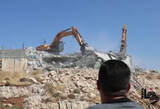
Israeli soldiers demolished, Tuesday, a residential building in Jabal Johar neighborhood, southeast of the southern West Bank city of Hebron, the Palestinian News & Info Agency (WAFA) has reported.
WAFA said dozens of soldiers invaded the area after surrounding and isolating it, and demolished an under-construction four-story residential building, and its basement. video
They added that the soldiers also demolished a well owned by the same Palestinian who owns the building, identified as Zayed Jamal Rajabi.
It is worth mentioning that the army repeatedly targets Palestinian homes and structures in that area, and in Hebron governorate in general, to remove the Palestinians and replace them with illegal colonialist settlers.
WAFA said dozens of soldiers invaded the area after surrounding and isolating it, and demolished an under-construction four-story residential building, and its basement. video
They added that the soldiers also demolished a well owned by the same Palestinian who owns the building, identified as Zayed Jamal Rajabi.
It is worth mentioning that the army repeatedly targets Palestinian homes and structures in that area, and in Hebron governorate in general, to remove the Palestinians and replace them with illegal colonialist settlers.
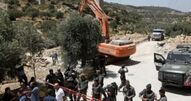
The Israeli occupation forces (IOF) on Tuesday morning destroyed a well and uprooted olive trees belonging to Palestinians in Umm al-Kibash area in the northern Jordan Valley. video
Local sources told a reporter for the Palestinian Information Center (PIC) that Israeli soldiers stormed an agricultural area in Umm al-Kibash belonging to local residents and embarked on destroying a well and uprooting olive trees.
They said that the Israeli army had already threatened to raze the well and olive trees, claiming the area is a nature reserve.
Israeli forces uproot hundreds of olive trees in Tubas
Israeli army bulldozers on Tuesday uprooted hundreds of Palestinian-owned olive trees and destroyed four water wells in Tammoun town, south of Tubas.
Murshid Bani Ouda, one of the farmers affected by the incident, said that the Israeli occupation army chopped off over 530 olive trees and destroyed water wells in Um al-Kbeish area in Tammoun.
Bani Ouda noted that the Israeli army had previously threatened to uproot the trees and demolish the wells under the pretext that the area is a "nature reserve", but the owners managed to thwart the Israeli move after legal efforts.
The term "nature reserve" is usually used by Israel in the West Bank as a tool to seize Palestinian lands for settlement purposes.
Local sources told a reporter for the Palestinian Information Center (PIC) that Israeli soldiers stormed an agricultural area in Umm al-Kibash belonging to local residents and embarked on destroying a well and uprooting olive trees.
They said that the Israeli army had already threatened to raze the well and olive trees, claiming the area is a nature reserve.
Israeli forces uproot hundreds of olive trees in Tubas
Israeli army bulldozers on Tuesday uprooted hundreds of Palestinian-owned olive trees and destroyed four water wells in Tammoun town, south of Tubas.
Murshid Bani Ouda, one of the farmers affected by the incident, said that the Israeli occupation army chopped off over 530 olive trees and destroyed water wells in Um al-Kbeish area in Tammoun.
Bani Ouda noted that the Israeli army had previously threatened to uproot the trees and demolish the wells under the pretext that the area is a "nature reserve", but the owners managed to thwart the Israeli move after legal efforts.
The term "nature reserve" is usually used by Israel in the West Bank as a tool to seize Palestinian lands for settlement purposes.
